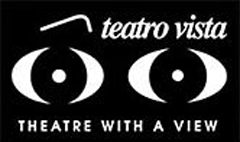
In Artistic Director Eddie Torres' words, Teatro Vista exists to "give an opportunity to actors to reflect voices that are seeking to be heard." It is a fundamental understanding of the creative exchange between author and actor that composes theater—an exchange that forms the backbone of Teatro Vista.
Teatro Vista co-founders Eddie Torres and Henry Godinez lamented an absence of Latino voices on Chicago stages when they first met in the late 1980s. With acuity they realized that this simple fact indicated a complicated web of disenfranchisement. Writers, actors, and audiences all - not only of Latino descent, but any engaged in a multicultural world - were being deprived of stories born of and relevant to Latino culture. Forming Teatro Vista was their effort to change that.
In a city flush with actors and writers looking for work, finding and encouraging an audience has been perhaps the most challenging part of this mission. "A Latino theater-going person? This person didn't exist in 1989," says Torres, laughing, "If you don't have an audience then you don't have a demand, and if you don't have a demand then people won't want to make the work." Twenty years later, Torres says things are changing. "They're coming out. It's been a struggle, but every year we continue to exist they come out more and more."
For those worried about being left out by Teatro Vista's cultural focus, Torres sees inherent multiculturalism in the term Latino. "What is Latino? All the big world cultures - Indigenous, African, European and Asian - I look at Latinos as a mix of all of these." Torres emphasizes an inclusive mission, "supporting and developing a Latino voice with a global perspective. Pieces that reflect the culture, but always in a universal way."
Perhaps exemplifying this desire is Teatro Vista's recent success, Our Lady of the Underpass by Tanya Saracho. This Chicago-centered world premiere was an alternately comic and tender play composed of monologues based on real interviews from April of 2005, when a figure that may have been the Virgin Mary appeared on the concrete wall of the Fullerton Avenue underpass of the Kennedy Expressway. Praised in the Chicago Tribune as "the sort of story we need onstage," the play took a single event important to Chicago's largely Catholic Latino community as a door into the diverse cultures and individuals that make up the city. "We just happen to be Latino," Torres says, "We think it's as people we're important."
A standout in their history is a staged reading of The Crucible that the company performed at the Court Theatre in 1999. For a company typically so intent on giving life to new and underrepresented voices, Arthur Miller may seem like a strange choice, but Torres says there is an interest in producing more adaptations and more revivals of "classic" plays with a Teatro Vista twist. Indeed, just as the Latino experience is relevant to non-Latino audiences, decidedly non-Latino theater (Torres also hinted at upcoming projects involving Ibsen, Chekov, and others) is deeply relevant to the Latino community. "We want to get those voices out there - that universal voice - and bridge cultural gaps."
Other than a close-knit acting ensemble Teatro Vista does not boast a signature style, opting rather for the flexibility to present a wide range of stories and voices. "Telling the story honestly is more important than telling the story our way" says Torres. So it is that this company is focused more on its point of view (the vista in Teatro Vista) than a kind of grand artistic unity. This flexibility has also helped their ensemble to comfortably collaborate with many of the larger theaters in Chicago. Victory Gardens, the Goodman, Steppenwolf, Next Theatre, Court and many others have partnered with Teatro Vista on productions relevant to the Latino community, in the process offering even broader venues to share their point of view, and give even larger life to so many voices wanting to be heard.
To learn more about these voices and about Teatro Vista's productions and point of view, you can visit their website or become a fan on Facebook.
Benno Nelson
